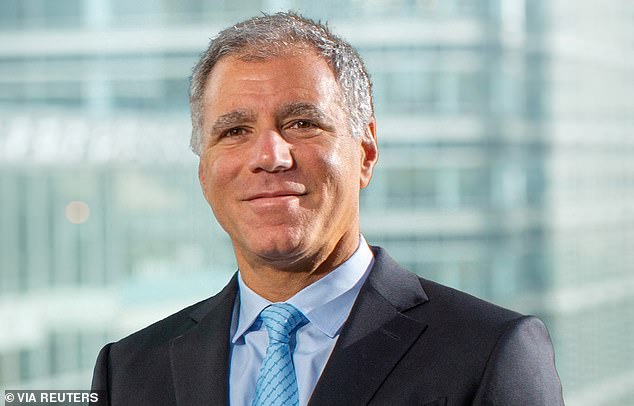Savers pull £3.6bn out of HSBC as they feel the squeeze from the cost of living crisis
HSBC customers in Britain withdrew £3.6 billion from their accounts in the summer as they were squeezed by cost-of-living pressures.
While profits rose to £6.4 billion in the third quarter, chief financial officer Georges Elhedery said the pullbacks were mainly due to households paying for increasingly expensive goods.
It came as figures from the Bank of England showed that the war chest of more than £200 billion in extra savings built up by households during the pandemic is now close to zero.
And separate research from Royal London suggested that struggling consumers withdrew £32 billion last year as they faced rising house, food and energy bills.
HSBC said the decline in customer deposits reflected “the higher cost of living” and competition with other lenders.

Uncertainty: As third quarter profits rose to £6.4bn, chief financial officer Georges Elhedery (pictured) said the pullbacks were due to households paying for expensive goods
Elhedery said: “We have seen this reduction in the form of additional spend that our customers used for their everyday purchases. A small part of them chases higher yields elsewhere.’
He said the UK economy has shown “resilience” overall and the bank has seen growth in mortgage lending, but added: “There is certainly uncertainty.”
The company has set up an undisclosed provision to take that into account, and Elhedery said it is closely monitoring mid-market business customers “involved in consumer discretionary spending.”
“They are the ones most affected by high inflation and cause the greater risk,” he said. “With the exception of a few names, we have not seen any deterioration in the sector.”
HSBC, which is based in Britain but makes most of its money in Asia, was the last major British bank to post a profit boost on rising interest rates after the results of Barclays, Lloyds and NatWest.
All four were criticized yesterday by Harriett Baldwin, chair of the Commons Treasury select committee, for being ‘far too slow to reward savers with better rates on direct access savings accounts’.
HSBC’s total profit figure of £6.4 billion for the three months to the end of September – more than double its profit in the same period last year – seems unlikely to quell this criticism.
But there are signs that the big profit boom driven by higher interest rates may be coming to an end.
HSBC’s net interest margin, the gap between the money it earns from borrowers and the returns it must provide to savers, shrank slightly from the previous period, although it was higher than last year.
UK deposits are £13.9 billion lower than a year ago, but still £50 billion higher than at the end of 2019.
It came as Bank of England figures showed a continued trend of customers looking to park their money in savings products that pay higher interest rates.
Behavior has changed since the pandemic, when households, unable to spend money on going out, built up extra savings, estimated at more than £200 billion.
Analysis by Simon French, chief economist at Panmure Gordon, shows that the gap has now closed.
Household deposit levels of just over £1.8 trillion are now around the same as if they had continued to grow in line with inflation since February 2020, the analysis showed.
